
Kunming Zoo is located in Yuantong Hill which is in the northern part of the urban area. It is 325,000 square meters. The Park consists Flower District and Animal District. The Flower District divides into the cherry, plum blossom, osmanthus, the rose garden and lawn areas. With the summer flowers in bloom, this experience will surprise you. And the animals District includes the large animal, the small animal, songbirds, waterfowl and other faunas. There are more than 50 kinds of animals (more than 900 animals in all.) on display in Kunming Zoo.For example, elephants, Bengal tiger, leaf monkeys, gibbons, black-tailed python, small pandas and brown necked Hornbill, peacocks and other animals,the bison from local Yunnan, as well as panda, golden monkey, Northeast tigers, red-crowned cranes and Chinese alligator. Kunming Zoo is a park for people who are curious about those animals.
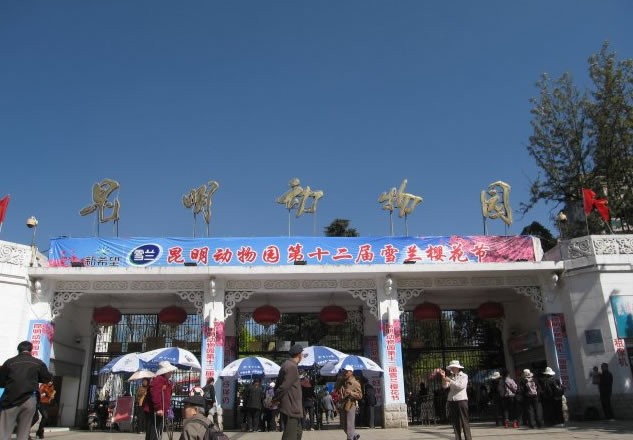
Kunming Zoo, (A few hundred metres north east of Green Lake, a few hundred metres east of Yunnan University, buses 101, 92, 95 to south side, buses 4, 22, 59. 74, 83 to north entrance), ? +86 871 5154546. The Zoo was built in 1953 and has over 300 species. There is a peacock garden, butterfly enclosure, avery and aquarium. In spring the zoo is reputed to be a sea of flowers, in particular the blossom of cherry trees and weeping Chinese crabapple trees. Overall the zoo is a pleasant enough place but with a slight air of weariness and decay about it. Local people also use it as a place for performing exercise or playing cards and mahjong. ¥10 with further ¥3 for the butterfly and peacock park.
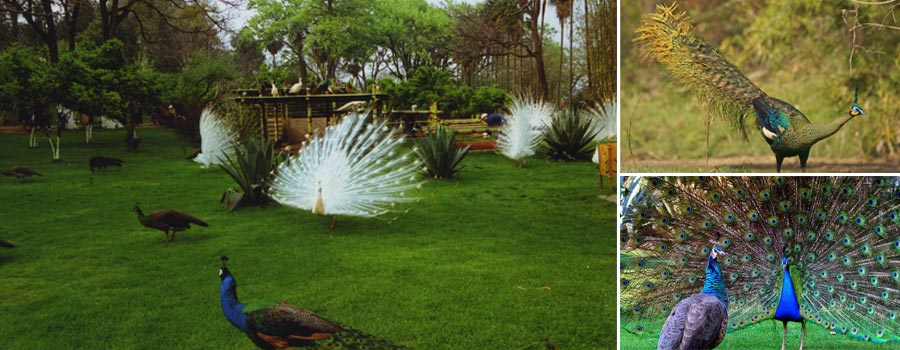
Travel Tips:
1. Be carefull if you want to be photographed with a tiger or other wild animal because a camera flash may startle the animal.
2. pay attention to the perform time,if you want to watch the elephant s’ performing.
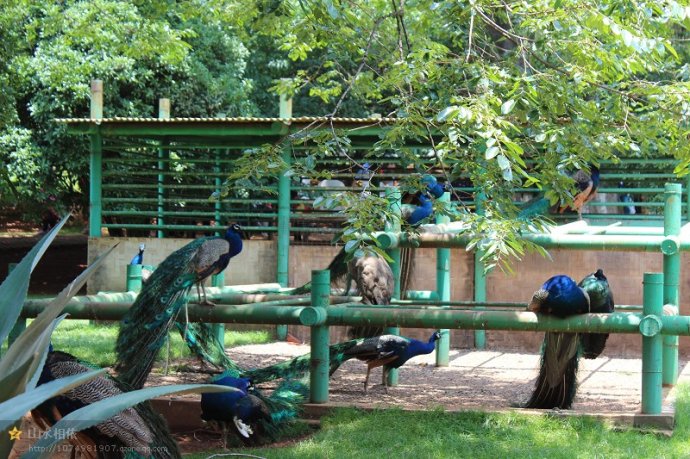
Small warning for Kunming Zoo
Went to Kunming Zoo the other day. I've lived in Kunming for 2 years and finally I went there with my Chinese fiancee. Just a small note on that... DON'T GO THERE! In fact I am ashamed that I even sponsored such a dump with my money. The animals live in small cages made of concrete and metal bars. They sleep in their own shit and urine, they eat things not even close to their natural diet (Not even concidering that there are idiots throwing yoghurt, candy, plastic bottles etc. into their cages)
The Chinese around me complained on how dirty the animals were and after making a face quickly went over to the next cage. One of the bears inside the compound is completely crazy... and not in a cute way... actually crazy.
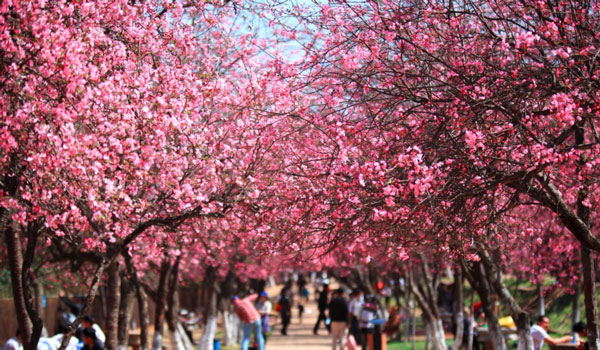
The zoo is distressing but hundred percent better than a few years ago so hopefully can only get better.Went last week and was looking beutiful with all the cherry trees in blossom. A mellow atmosphere with families out enjoying Kunming at its best. Zoo gardens worth a visit, early mornings lots of retired people out exercising and showing off their birds singing skills.Dont look in the cages and you can have a few quite hours in the middle of Kunming city.You can eyeball the fish for a bit of nature gazing.Impressive collection in all shapes and colours.Entrance fee only 10 yuan.
The Kunming zoo is very disturbing, you'd have to remember to keep things in perspective. It wasn't that long ago when China was a fully communistic state and that such luxuries like a zoo did not exist. Also, currently there are people living in rural areas that are actually worse than the animal in the zoo, so it is difficult to get the average person to care very much about the well-being of an animal. Remember back to the 50s? maybe the 40s or the 30s. The way we treated and locked up animals in our own zoo is probably comparable. Ignoring the problem is not going to make it go away. what is needed is education and funding. People needs to be educated and well-informed which costs money. Most people I've dealt with aren't bad people, they just don't know any better.
1 post The Safari Park in north Kunming is much better. The animals have plenty of space to roam, and are clean and in good condition. I suppose for an animal, life in a Safari Park is much better that being eaten or skinned!
If people do not go to this zoo, two things will result. Either the zoo will close and the animals set free or more likely, Kunming will upgrade and improve the zoo so people will want to support it. The money is available, just the will of the politicians are not. This zoo is really an embarrassment to our great city. Stop building just one road, and use the funds for something much more important! It's really not a money thing.
The zoo should be an example of how to treat animals, thus educating people to be compassionate to animals.
I hear you and I agree with you and TheSwedishGuy 100%, the conditions at the zoo is atrocious and didn't an antelope or some kind of animal died at the safari zoo because the visitors fed it a plastic bag and it got stuck in the intestines or something. You point is my point as well. Management will get away with what the paying public allows them to. If people protests the conditions by not going to the zoo then things well change immediately. The problem however, is that the average person knows nothing about basic animal welfare and so it is not likely they will demand a change in the conditions at the zoo anytime soon.
What I was trying to say is that telling people not to go to the zoo is not a practical solution because they know nothing about animal welfare and so wouldn't listen. To really get the conditions changed we need to either educate the public about animal welfare and why we should show empathy towards them or to convince a few key government official why the conditions needs to be changes, both of which is not very likely. The only thing we can do is have patience and things will improve on their own, slowly.
[NextPage]
6-YEAR-OLD CHILD KILLED BY ZOO TIGER reported by www.bornfree.org.uk
The Born Free Foundation continues to seek ways to address captive animal exploitation in China. On Thursday 22nd February, a six-year-old girl named Rui Xin was mauled to death by a tiger at Kunming Zoo in Yunnan province, China.
The young girl had been standing next to the tiger to have her photograph taken by her uncle. When the camera’s flash went off, the tiger was apparently startled and lunged at the child. The tiger held the child’s head in its mouth for over a minute, despite zoo keepers used wooden clubs and a bench to beat him.
The child’s mother was bitten on the arm whilst trying to rescue her daughter, who was later pronounced dead with a crushed skull in hospital.
The male tiger that bit Rui Xin is one of Kunming Zoo’s six performing tigers, and has been performing and used as a photographic prop there for almost two years.
Kunming Zoo hit the headlines in 2001 when a zookeeper was mauled to death by a tiger when she entered its cage, and again in January 2007 when another performing tiger bit a four-year-old boy, who survived the attack.
In 2005, Born Free’s Zoo Check team was inundated with reports from concerned members of the public after one of Kunming Zoo’s tigers was pictured in international press chained to a bench with a child sitting on its back; the tiger’s teeth appeared to have been cut short to minimise danger to human participants, exposing the sensitive nerves within the tooth.
Around the world wild animals are extensively exploited in captivity and used for photographic opportunities in this way. Young animals are often removed from their mothers at an early age and have their teeth and claws removed, before being drugged, chained, and sometimes having their mouths wired shut, in order to serve as photographic props in tourist resorts. Zoo Check is actively campaigning to stop the use of wild, potentially dangerous animals as photographic props. We urge tourists not to support this unethical practice by paying to have their photos taken with these animals.
[NextPage]
A farewell to two zoos?
By Ma Guihua (China Feature)
Updated: 2004-06-29 00:32
Both the Kunming and Beijing zoos have been facing extinction. As their fates unfold, China Features' Ma Guihua explains why the areas are in conflict with urban development.
Zeng Guangyue can finally heave a sigh of relief. Just a month ago, the chief of the 51-year-old Kunming Zoo in the capital of Southwest China's Yunnan Province got a call from the city government that a plan to merge the zoo with the Yunnan Wild Animal Park had been dropped.
"This is the best result," says Zeng, head of the only zoo in the city of Kunming, which garners an annual income of some 20 million yuan (US$2.4 million) from more than 3 million admissions and ranks among the country's top 10 zoos.
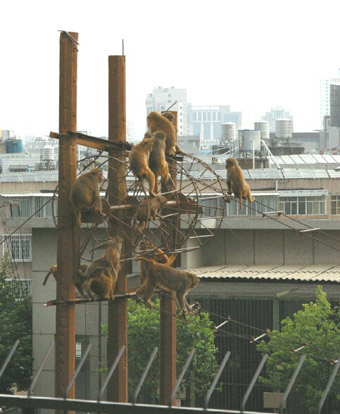 Monkeys at the Kunming Zoo play on a structure against a backdrop of an expanding cityscape. [newsphoto/file] |
But half a century after the zoo developed from a display with just four animals from four species into a property with 5,000 animals from 140 species, its superior agency -- the City Bureau of Parks and Woods of Kunming -- ordered it to give all its animals to the 150-million-yuan (US$18 million) Yunnan Wild Animal Park project, located on the city's outskirts.
Removing the zoo from near downtown Kunming is to "add more greenspace to the city" and "return the animals to nature," according to a leading bureaux official.
But Xian Rulun, a 64-year-old retiree who used to work with the Kunming Zoo as a senior engineer, is not convinced.
"The zoo is a well-run commonweal which belongs to the public and State," she says. "The wild animal park is a private enterprise. I could never understand why such a good base for zoological education and research should be dumped and its assets be given to a private entity -- Huzhou Jinjing Investment Co Ltd from Zhejiang. Isn't this a drain of State property?"
The bureau official maintains that moving zoos out of the city and building wild animal parks "are a trend in urban development." Indeed, more than 30 wild animal parks have been cropping up across the country aside from the one in Kunming.
Unlike safari parks in Africa and in San Diego County in California where indigenous animals thriving in their natural habitat are viewed by visitors driving through in vehicles, in China, most such parks are simply artificial surroundings for animals to run loose, some experts point out. So there is no essential difference between such parks and zoos, except parks are farther out of ordinary citizens' reach and charge more for admission.
In Kunming's case, the zoo charges 10 yuan (US$1.25) for adults and five yuan (about 60 cents) for children, as compared to the park's 35 and 100 yuan (US$4 or 12) for locals and tourists from outside Kunming, not to mention its distance from the city.
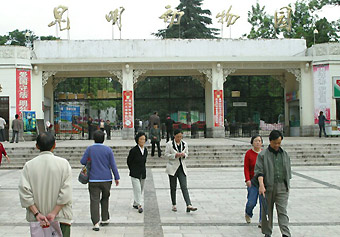 The zoo, founded in 1950, seems to have survived a merger proposal. It was suggested that the zoo should have been merged with a privately run wild animal park. [newsphoto] |
The price gap indicates a conflict of interest between parks and zoos, observes Yue Weiping, director of the Kunming City Environmental Protection Committee for Urban and Rural Construction. As a commonweal, a zoo focuses on education, research and other public interests, while a park as an enterprise is destined to pursue profits.
"So it is not appropriate for a wild animal park to be built at the cost of an existing and profit-making zoo," he says.
What is also outrageous, says Yue, is that the deal was largely kept from the public and the provincial government department in charge of the matter. And the two contracts signed for the "merger" are far from fair and equitable.
The first contract, signed between Jinjing company and Kunming City Bureau of Parks and Woods, stipulates that Jinjing is to lease "large and medium-sized" zoo animals for 60 years at 3 million yuan (US$360,000) per year. Neither party is to shoulder responsibility for the loss of any animal "due to natural deaths." All newly bred animals belong to Jinjing, which is to ensure the placement of 60 staff workers from the Kunming Zoo. Once the contract takes effect, the latter is not to put up a new zoo.
According to an investigative report by China Society of Zoos, no notary office would notarize the contract since it found the Kunming bureau is a government body and is not in a position to sign such business contract. Also, the 60-year lease period is not legal under the Contract Law.
The report adds that the Kunming Zoo is an independent, legal entity. Despite its supervision of the zoo, the bureau cannot sign business contracts on its behalf, especially when the zoo is not knowledgeable of the deal. What's more, animal leasing is in essence a transfer of intangibles such as the brand of the Kunming Zoo and great loss of State assets. When all the animals die in the end, the value of State asset will be zero.
To get the wild animal park going, a second contract was signed on April 2 between Yunnan Wild Animal Park and the Kunming Zoo. This time, the leasing was turned into "a transfer once and for all." The wild animal park shuns the duty for the placement of the zoo staff. And the zoo still shall not set up any new zoo.
"I was reluctant to sign the contract," says Li Yunkui, executive head of the Kunming Zoo. "But as a subordinate under the bureau, we had to obey the decision made by the managerial department of the city government."
The terms of the contract, says Yue, "ensure the park's business monopoly." For a matter that pertains to the interest of most citizens, like closing the Kunming Zoo, he says, should not be decided behind closed doors without discussions at the people's congress or the political people's consultative conference.
A team of deputies to Kunming City People's Congress and members of the local committee of the Chinese People's Political Consultative Conference investigated the issue, and agreed that the zoo -- as an important leg for popularizing science -- is a public asset and cannot be replaced by the park.
Amid all the debates, the park opened its door on its own on April 28 in an attempt to cash in on visitors during the weeklong May Day holiday. As local newspapers reported, the park accounted for about 80 per cent of complaints lodged in the province during the holiday.
What's more appalling is the fate of animals in the park, who either fall sick or are dying, says a vet from the Kunming Zoo who helped with the park's construction. He says three spotted deer were knocked dead. One ostrich suffered a broken leg, while two black bear cubs, four eland and one chimpanzee died.
"A chimpanzee normally eats 7-8 kilograms of good apples a day, aside from some milk and beef. But here at the park it is only fed 3-4 kilograms of poor apples," says the vet who would not reveal his name.
It is no wonder that about two weeks after its opening, the park was suspended for a house cleaning.
Although the zoo is supposed to transfer some of its superfluous animals to the park to support it, Zeng Guangyue of the zoo says "so far we have sent none. It's basically settled that the zoo and the park are to co-exist independently from one another."
Fate of Beijing Zoo
Although the Kunming Zoo has been saved by overwhelming pressure from scholars and the public, it does not mean the fate of zoos in other Chinese cities has been settled.
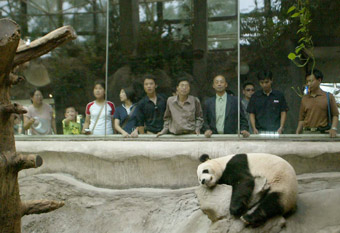 Viewers look at a panda at the Beijing Zoo. [newsphoto/file] |
Data from the China Society of Zoos show that at least 16 zoos across the country are moving or have been moved from urban centre to make way for urban construction and real estates development.
"After moving to the suburbs, most of the zoos have been turned into enterprise-like entities or wild animal parks, with admission fees rising at least five to 10 times the original," a society staffer said.
The distribution of the wild animal parks isn't planned. In Southwest China, five such parks were built in a matter of three years. In South China's Hainan Island, there are three of them in a distance of 10 kilometres from one another. Insiders estimate that two-thirds of the wild animal parks are barely able to survive.
Nevertheless, one after another city is deciding to remove its zoo from the city environs. This is because developers have been coveting the sites of the zoos, since they have gradually become closer to downtown areas in the course of urban expansion, observes Liu Nonglin, senior engineer with the Society.
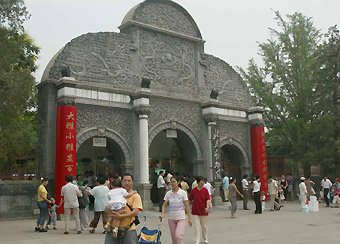 Beijing zoo. [newsphoto/file] |
A late pending case is the Beijing Zoo, largely regarded as the national zoo as it was built in 1906 during the late Qing Dynasty. Words started to leak out in late April that the country's first zoo was about to be moved 35 kilometres away to Daxing District in Beijing's southern suburbs and merge with the wild animal park there.
Officials from the Beijing Development and Reform Committee justify the motion on the ground that, given its current location, the zoo is a threat to public health and adds pressure to already intense traffic. They also say that confining the over 6,000 animals of more than 500 species to a small area of 93 hectares in downtown Beijing is no good to their welfare.
"These are but far-fetched and misleading excuses," says Liu Nonglin. "City and road development have more to do with city planning than the location of a zoo. And removing a zoo does not necessarily lead to improvement of animal welfare."
Other experts point out that the ground in Daxing is sandy and can hardly hold water. The wild animal park there has to pave the ground with plastic film to store water. "How can a zoo be put up in such a place?" Liu queries.
"As far as I know," he adds, "those who are most interested in the moving of Beijing Zoo are real estate developers desperate for land." He challenges the wisdom of the removal motion, warning that the wild animal park at Daxing is 200 million yuan (US$24 million) in debt to the bank and its staff workers haven't been paid for three successive months.
He and more and more people are also against the practice to keep plans of zoo removals a secret, even not consulting the zoo management. Some activists have tried to involve the public in discussions of whether the zoo should be removed.
As a latest development, a spokesman from the State Administration of Forestry said at a news conference the administration would send experts to attend the debate on the removal of Beijing Zoo. "Any sites could be alternatives for the zoo so long as it is good for animal habitation and breeding. In the meantime, opinions from citizens should also be considered," says Zhao Xueming, deputy chief of the administration.
The survival of Kunming Zoo is certainly encouragement to activists who wish to keep the Beijing Zoo in place. As Liu Nonglin points out, the final decision will be crucial since it will have a ripple effect throughout the nation.
Admission Fee:¥0

You will only receive emails that you permitted upon submission and your email address will never be shared with any third parties without your express permission.
